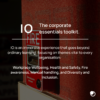When it comes to high-reliability and first-responding roles, institutions and firms have long adopted training simulations to assist learners to transfer knowledge and experience before actively starting in their role. Enter VR.
Previously, most of these firms relied on classroom or real-world training exercises. Some sectors, such as aviation and medicine were pioneers of immersive technologies such as VR and AR to supplement existing training programmes, and the results were impressive – for example, virtual-reality assisted trainee surgeons scored double in their practical tests compared to their peers who used traditional training methods.
For the security and defence sector, VR represents today a turning point, immersing personnel in scenarios that can’t be replicated. This allows contractors to obtain crucial experience dealing with high-stress, life-threatening situations, while also testing trainees’ critical thinking abilities in a controlled environment.
According to a 2019 Deloitte study, police officers who were trained for helicopter operations using immersive technologies had the highest rates of knowledge transfer and learning outcomes after their training, compared to officers who were trained in a helicopter and under traditional training methods.
Virtual reality may also address several issues that have plagued security and defence training for years, as well as eliminate specific training impediments – Here’s how:

Here at MOONHUB, we are well aware of the sensitive variables that our security partners face in their day-to-day, and our virtual reality technologies are designed to equip them with the skillsets to overcome these variables. We provide virtual training and more importantly, real results and last week’s honour is a testament to that.
Together with our security partner Corps Security, the oldest security firm headed by Her Majesty The Queen, we won the 2022 Outstanding Security Training Initiative award at the Outstanding Security Performance Awards (OSPAs).
The OSPAs recognise and reward companies, people and innovation across the security sector. The criteria for these awards are based on extensive research on key factors that contribute to and characterise outstanding performance.
”"Our relationship with MOONHUB has been one of connection. We have ingrained within each other’s business, captured and harnessed the true capability of such technology and stitched this into the fabric of Corps Security’s business" - Seetan Varsani, Director of Corps’ Major Accounts & Strategic Development.
You can read more on our testimonial with Corps Security here.








